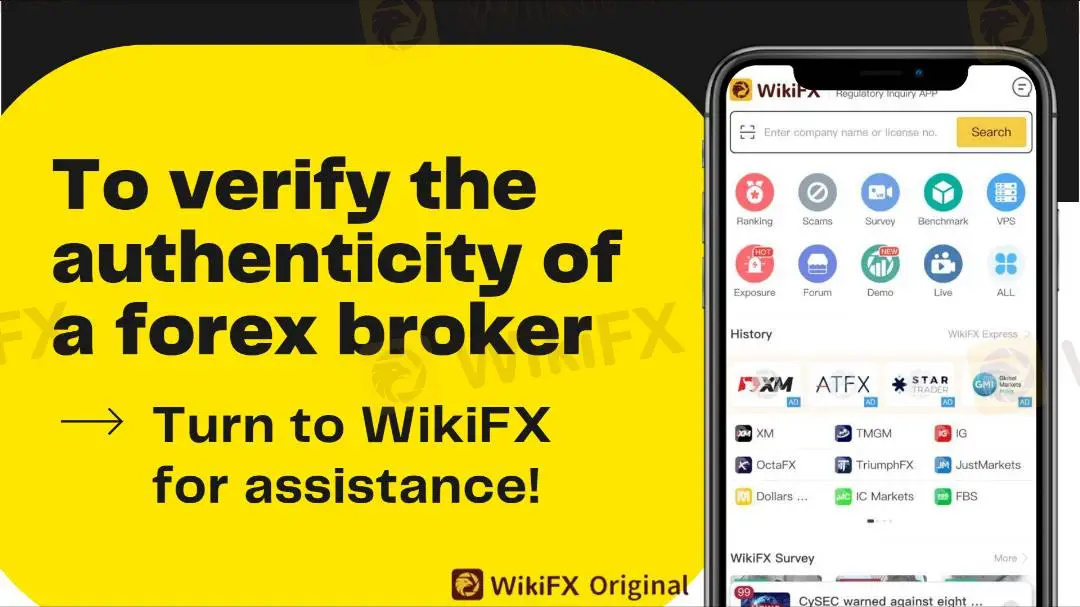简体中文
繁體中文
English
Pусский
日本語
ภาษาไทย
Tiếng Việt
Bahasa Indonesia
Español
हिन्दी
Filippiiniläinen
Français
Deutsch
Português
Türkçe
한국어
العربية
To verify the authenticity of a forex broker, turn to WikiFX for assistance!
Abstract:This article discusses the importance of verifying the authenticity of forex trading providers and how to use WikiFX to do so. It provides a step-by-step guide on how to search for a forex trading company, check its information, and avoid fraudulent platforms.

As more and more people are getting into forex trading, it's important to note that trading on forex platforms carries inherent risks. Additionally, many people have fallen prey to fraudulent platforms, which prevent them from withdrawing their funds. Therefore, it's crucial to verify the authenticity of forex trading providers. One way to achieve this is by using WikiFX.
How to verify the authenticity of forex broker?
Search for WikiFX.
For new users, the first step is to search for WikiFX on Baidu or other search engines. You'll find plenty of information about WikiFX, including the WikiFX official website and WikiFX news.

Visit the WikiFX official website.
Once you find the WikiFX official website, click on the link to enter the site and browse the information available.
Enter the name of the forex trading company
Next, click on the forex trading company search bar and enter the name of the company you want to search for. Then click on search to see a list of related forex trading platforms.

Check the forex trading company information
Finally, click on the corresponding forex trading company and go to its details page to view information such as the company's regulatory status, registration information, WikiFX rating, and customer reviews.

To help you understand better, let's take an example from WikiFX:
Suppose you want to make a deposit with IG Forex, which offers various account types, including MT4 accounts, MT5 accounts, and IG exclusive trading accounts. IG Forex claims not to charge commission fees but only spread costs. It also provides convenient deposit and withdrawal methods, including support for RMB, credit cards, and international wire transfers.

These are the methods shared by WikiFX for identifying the authenticity of forex trading companies and using WikiFX to check them. We hope this information is helpful to you! If you want to file a complaint against a forex trading company but are not sure if it is legitimate, you can search for the company's information on WikiFX to learn more before considering depositing funds to avoid being scammed!

Disclaimer:
The views in this article only represent the author's personal views, and do not constitute investment advice on this platform. This platform does not guarantee the accuracy, completeness and timeliness of the information in the article, and will not be liable for any loss caused by the use of or reliance on the information in the article.
Read more

The Ultimate Guide to Automated Forex Trading in 2025
Modern markets are revolutionized by automated trading systems, which now execute 70-85% of all transactions. These advanced automated trading software solutions, commonly called trading robots or Expert Advisors (EAs), leverage algorithmic precision for automatic trading across forex, stocks, and commodities 24/7. By removing emotional interference and executing trades in microseconds, auto forex trading platforms create fair opportunities for all market participants. For those new to automated trading for beginners, these systems provide disciplined, backtested strategies while significantly reducing manual effort.

Will natural disasters have an impact on the forex market?
The forex market is known for its rapid responses to global events, but the influence of natural disasters, such as earthquakes and typhoons, can be less straightforward. While headlines may scream about catastrophic damage and economic disruption, the long-term effects on currency values often depend on a blend of immediate shock and underlying economic fundamentals.

How Reliable Are AI Forex Trading Signals From Regulated Brokers?
Discover how reliable AI Forex trading signals are and why using a regulated broker boosts their effectiveness. Learn key factors to evaluate accuracy and enhance your trading.

Top Currency Pairs to Watch for Profit This Week - March 31, 2025
Discover the top 5 currency pairs to trade for profit this week, March 31, 2025—USD/JPY, EUR/USD, GBP/USD, AUD/USD, USD/CHF—with simple strategies and best times.
WikiFX Broker
Latest News
How Crypto Trading Transforms FX and CFD Brokerage Industry
UK would not hesitate to retaliate against US tariffs - No 10 sources
FCA Warns Against 10 Unlicensed or Clone Firms
CySEC Warns Against 14 Unlicensed Investment Websites
Top Currency Pairs to Watch for Profit This Week - March 31, 2025
Will natural disasters have an impact on the forex market?
Philippines Deports 29 Indonesians Linked to Online Scam Syndicate in Manila
Navigating the Intersection of Forex Markets, AI Technology, and Fintech
Exposed: Deceptive World of Fake Trading Gurus – Don’t Get Fooled!
AI-Powered Strategies to Improve Profits in Forex Trading
Currency Calculator







